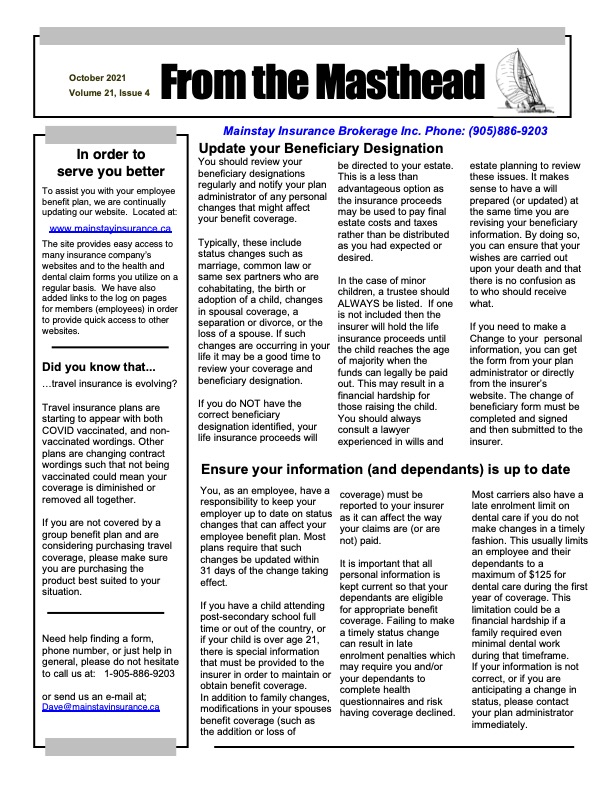Just over a month ago I did a post mentioning this piece of legislation that was proposed. It has now been passed and is awaiting Royal Assent. One thing to notice (that will affect ALL employers) is the the banning of non-compete agreements which will also become law when the Act receives Royal Assent and will be backdated to October 25, 2021. Read below for more…
Author: admin
Challenging Mandatory Vaccination Policies In Ontario: Arbitrators Take A First Look And Reach Differing Conclusions
The majority of our clients are NOT unionized, but these decisions often form the legislative, and regulatory rules that follow.
There are now three recent Ontario arbitration decisions that address whether an employer may require its unionized employees to be vaccinated. While directly relevant to unionized employers, given the lack of case law considering the issue, these decisions may have further-reaching impacts on all employers in Ontario.
Evolving Issues in Workplace Investigations Seminar -Thursday at noon
If you are interested, Williams HR Law is putting on this free lunchtime webinar tomorrow.
This webinar covers how the evolving landscape of our New World of Work has impacted how employers conduct and address issues related to workplace investigations. Topics will include common pitfalls in conducting workplace investigations in our current climate; critical considerations when selecting investigators; and when investigations may require specialized training in equity, anti-oppression, anti-racism, and/or trauma.
The Zoom link will be provided to all registrants prior to the event. For those who have not yet registered, please click here to register.
Is Refusing To Get Vaccinated Just Cause For Termination In The Non-unionized Workplace?
There has been a fair amount of discussion around vaccination policies and the impending unpaid leave of absences, with possible termination coming down the road. At the moment, they are only discussion as we have seen no court cases (yet) to provide direction. Arbitration cases have gone both ways, but it’s still early days. The article below identifies some of an employers considerations.
As workplaces around the country implement employee vaccination policies in response to the pandemic, the obvious question arises of what can be done to enforce them. A well-crafted policy will include provisions on what discipline may apply to employees who fail to comply. However, the existence of a policy statement regarding treatment of non-compliant employees does not, in and of itself, justify all disciplinary measures carried out thereunder.
Employment Update: When Can Employers Provide an Exemption to COVID-19 Vaccination Policy Requirements?
An interesting article has been posted by Blaney McMurtry Employment Lawyer. It contains information on bon fide reasons for exemptions (very few it appears) and what they must contain. Also interesting is the reference to the Ontario Human Rights Commission statement we posted back on September 22nd.
In our September 9, 2021 Employment Update: Reopening Workplaces and Vaccination Policies, we reported on recommendations for employers in Ontario to institute a workplace vaccination policy to protect their employees and the public from COVID-19, as well as some considerations for such policies.
While the provincial government has not mandated vaccination for all workplaces, Ontario’s mandatory proof of vaccine requirement for patrons of certain indoor public settings commenced on September 22, 2021. In the context of these new regimes, the question that has been left for employees and employers alike, is: Who can be exempt from these vaccination policies?
Updated Guidance On How Employers Should Fill Out Records Of Employment During COVID-19 Pandemic
If you are wondering how to code Records of Employment forms (ROE’s) in this “COVID” era, take a quick read of this short article below…
The Record of Employment (ROE) (Block 16) provides information on an employee’s employment history when they apply for Employment Insurance (EI) benefits. The information on an ROE is used by Service Canada to determine the employee’s eligibility to receive EI benefits, the benefit amount, and how long the benefits will be paid. Employers must issue an ROE each time an employee experiences an interruption of earnings. Canada provides a guide on How to Complete the ROE form.
Ontario to propose ‘right-to-disconnect’ laws
I’m not so sure that Ontario employers need any more legislation, but those with over 25 staff could be required to implement “right to disconnect” standards in the very near future. Take a read of the article below for more information.
Ontario employers will soon be required to create right-to-disconnect policies for their workplaces, in an effort to address the ills of “hyper-connectivity.”
Legislation expected to be introduced this week will, if passed, require workplaces with more than 25 employees to develop internal right-to-disconnect standards. The move would make Ontario the first province in Canada to implement such a measure.
Editorial: Projections for drug costs a mixed bag for plan sponsors
Our clients have seen average OVERALL benefit plan rate increases (including all benefits, not just drugs) of less than 4.5% over the past 15 years. 2017 brought some higher increases averaging 7.5% (partly due to aging) but according to the article below, we may see the rate of increase slow again over the coming year.
According to projections released by Aon Hewitt in December, costs for extended health-care plans will likely rise by six per cent in 2018. After inflation of 2.1 per cent, the net projected cost increase is 3.9 per cent. That’s down measurably from an overall cost increase of eight per cent in 2017 and a net rise of 6.1 per cent. And the numbers compare well to the global gross cost increase of 8.4 per cent. For Article CLICK HERE



